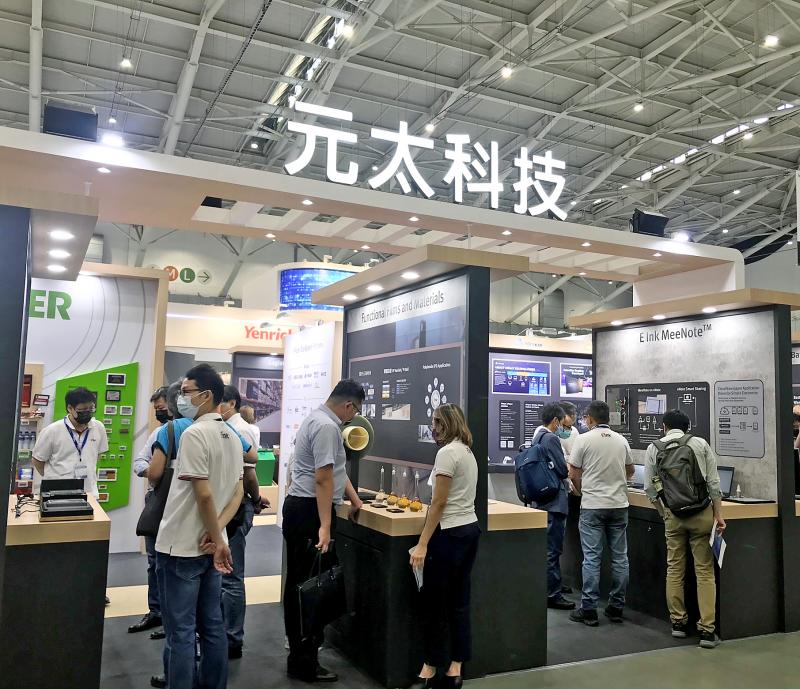E Ink Holdings Inc (元太科技) yesterday said it would further expand capacity to cope with robust demand for e-paper displays used in e-readers, e-notes and electronic shelf labels, as the COVID-19 pandemic and rising inflation have not dampened consumer demand.
Although rising inflation is weakening companies’ purchasing power, E Ink said that its customers have not scaled down orders for e-paper displays used in e-readers.
“Reading is still the most affordable leisure activity that people have,” E Ink CEO Johnson Lee (李政昊) told an online investors’ conference in Taipei.

Photo: Chen Mei-ying, Taipei Times
As e-books are less expensive than paper books, “we have so far not seen a slowdown in demand,” Lee said. “We are seeing quite robust demand.”
Demand was also aided by E Ink’s launch of better-performing colored e-paper display technologies to replace e-readers with monochromatic displays, Lee said.
Large-scale retailers are more rapidly adopting electronic labels due to price volatility and inflation, as well as higher labor costs and worker shortages, he said.
E-papers used in electronic labels, which replaced those used in e-readers, became E Ink’s biggest revenue contributor last quarter, accounting for 52 percent of the company’s total revenue of NT$5.96 billion (US$200.61 million), the company said, adding that this was a significant increase from 40 percent a year earlier.
To meet demand, E Ink said that it would double this year’s capital expenditure to more than NT$4 billion.
The firm is to launch three new production lines for e-paper displays this year, Lee said, adding that another new production line would be postponed until the first quarter of next year because delivery of the equipment had been delayed.
To boost production, E Ink might convert part of a new office building into a manufacturing site, he said.
The office building is to open next year, he added.
Lee said that the impact from COVID-19 lockdowns in China has been negligible.
The large-scale shutdowns in Shanghai did not spread to Jiangsu Province’s Yangzhou, where E Ink operates an e-paper display module factory, he said.
Transportation snarls have elevated logistics costs, but that is manageable, he said.
E Ink reported that net profit in the first quarter increased 25 percent year-on-year to NT$1.46 billion — the second-highest in the company’s history — compared with NT$1.17 billion a year earlier, while earnings per share rose to NT$1.28 from NT$1.03 a year earlier.
Operating profit margin jumped to 24 percent, from 22 percent a year earlier.
Gross margin this quarter is likely to decline, as shipments of lower-margin e-reader modules would increase ahead of the peak season in the third quarter, the company said.
Revenue in the first quarter rose 14 percent annually to NT$5.96 billion, the highest in 11 years, it said.

Sweeping policy changes under US Secretary of Health and Human Services Robert F. Kennedy Jr are having a chilling effect on vaccine makers as anti-vaccine rhetoric has turned into concrete changes in inoculation schedules and recommendations, investors and executives said. The administration of US President Donald Trump has in the past year upended vaccine recommendations, with the country last month ending its longstanding guidance that all children receive inoculations against flu, hepatitis A and other diseases. The unprecedented changes have led to diminished vaccine usage, hurt the investment case for some biotechs, and created a drag that would likely dent revenues and

Macronix International Co (旺宏), the world’s biggest NOR flash memory supplier, yesterday said it would spend NT$22 billion (US$699.1 million) on capacity expansion this year to increase its production of mid-to-low-density memory chips as the world’s major memorychip suppliers are phasing out the market. The company said its planned capital expenditures are about 11 times higher than the NT$1.8 billion it spent on new facilities and equipment last year. A majority of this year’s outlay would be allocated to step up capacity of multi-level cell (MLC) NAND flash memory chips, which are used in embedded multimedia cards (eMMC), a managed

CULPRITS: Factors that affected the slip included falling global crude oil prices, wait-and-see consumer attitudes due to US tariffs and a different Lunar New Year holiday schedule Taiwan’s retail sales ended a nine-year growth streak last year, slipping 0.2 percent from a year earlier as uncertainty over US tariff policies affected demand for durable goods, data released on Friday by the Ministry of Economic Affairs showed. Last year’s retail sales totaled NT$4.84 trillion (US$153.27 billion), down about NT$9.5 billion, or 0.2 percent, from 2024. Despite the decline, the figure was still the second-highest annual sales total on record. Ministry statistics department deputy head Chen Yu-fang (陳玉芳) said sales of cars, motorcycles and related products, which accounted for 17.4 percent of total retail rales last year, fell NT$68.1 billion, or

In the wake of strong global demand for AI applications, Taiwan’s export-oriented economy accelerated with the composite index of economic indicators flashing the first “red” light in December for one year, indicating the economy is in booming mode, the National Development Council (NDC) said yesterday. Moreover, the index of leading indicators, which gauges the potential state of the economy over the next six months, also moved higher in December amid growing optimism over the outlook, the NDC said. In December, the index of economic indicators rose one point from a month earlier to 38, at the lower end of the “red” light.